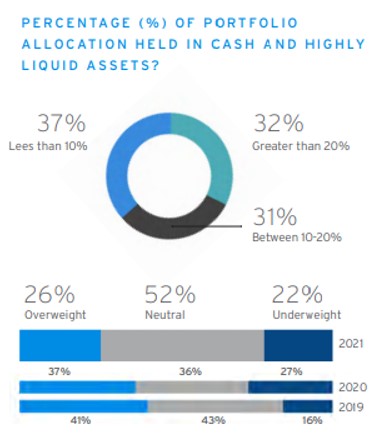Surveys
Family Offices Fret Over Rising Inflation - Citi Private Bank

In its sixth annual report of family offices, the US private bank delved into what these entities are concerned about. Perhaps, unsurprisingly, rising inflation is making them concerned.
A survey of family offices by Citi Private
Bank finds that these organisations are concerned about
rising inflation amidst heavy central bank money printing and
some of the disruptions caused by the pandemic.
The US bank carried out its poll during its annual family office
leadership programme held virtually in June. The total number of
survey respondents increased this year to 197 (versus 177 in
2020). Of those, 79 per cent were family offices, rising 24 per
cent year-over-year.
Increased inflation rates are giving investors and business
owners the jitters. In the US, the annual inflation rate was 5.3
per cent for the 12 months ending August 2021, following two
straight 5.4 per cent increases.
The Citi report said that four predominant themes emerged:
concern over rising inflation, the prominence of high cash levels
in the face of a low yield environment, continued growth in
portfolio allocation to direct investing opportunities, and a
marked comeback in portfolio values year-over-year despite a
prevalent degree of macroeconomic uncertainty.
While over three-fourths of all respondents seek returns of 5 per
cent or more over the next 12 months, the outlook is more
optimistic for family offices with assets under management of
over $500 million with 30 per cent seeking over 10 per cent
returns versus 19 per cent of family offices with AuM under $500
million.
The survey also logged rising interest in direct investing in
private enterprise. For almost half of the participants, this
level of exposure represents 25 per cent or more of their overall
allocation.
“In these unusual times, our exclusive survey offers an
invaluable glimpse of the thinking of family offices and other
leading investors,” Ida Liu, global head of private banking,
said. “It’s reassuring to note that investor sentiment isn’t
negative. Instead, family offices have weathered the COVID crisis
well and are uniquely positioned to deploy further capital as
they see opportunities arise. We stand ready to offer them our
fullest support in the emerging post-pandemic landscape.”
“Among our many intriguing findings, it’s the rise of direct
investing in private enterprise that reflects deep confidence in
the flexibility and strength of the global economy,” James
Holder, global head of Citi private capital group, Citi Private
Bank, said. “It also underlines the vital role family offices and
private capital play in supporting innovation, entrepreneurship,
development of the stakeholder economy, creating jobs and new
solutions to the challenges of our day.”
Also of note, the 2021 Family Office Survey found that two-thirds
of respondents responded as “overweight” or “neutral” when it
came to commodities in their portfolios, and there was also a
continued shift in interest in emerging market equities.
The study said that family offices own significant amounts of cash, and queried whether this was wise.
"Based on the responses, it is clear that family offices continue to hold significant cash, some perhaps hoping to time the markets, others seeking safety and liquidy. No matter what the reason, we see it as a potential detractor to overall portfolio performance given the low-yield environment. It would be prudent to revisit the main reasons for having such significant cash allocation," it said.

Source: Citi Private Bank
On global developed market equities, the report noted: "While investors appear to have taken a slightly more cautious view in 2021, driven by concerns of high valuation and record territory for indexes especially in the US, there certainly appears to be continued expectation of higher returns in this asset class with investors seeking out key sectors like healthcare, which still trades at a discount and can be defensive. We agree that the S&P 500 absolute valuations as measured by P/E ratios are not cheap on a historical basis, but when compared to the alternatives across other traditional asset classes (e.g. high-quality US bonds), valuations are still trading at average levels."